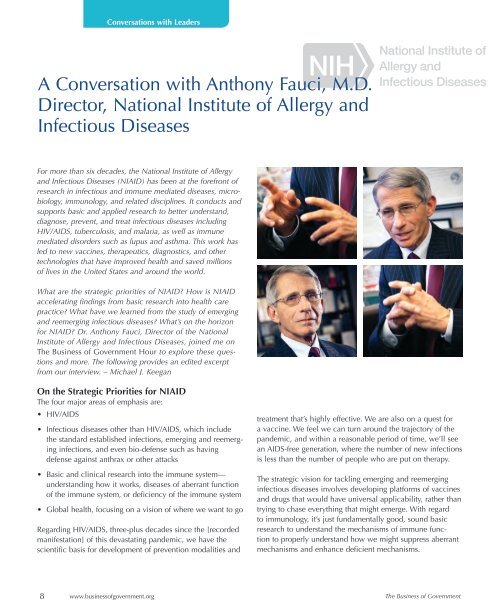1hmPUyl
1hmPUyl
1hmPUyl
Create successful ePaper yourself
Turn your PDF publications into a flip-book with our unique Google optimized e-Paper software.
Conversations with Leaders<br />
A Conversation with Anthony Fauci, M.D.<br />
Director, National Institute of Allergy and<br />
Infectious Diseases<br />
For more than six decades, the National Institute of Allergy<br />
and Infectious Diseases (NIAID) has been at the forefront of<br />
research in infectious and immune mediated diseases, microbiology,<br />
immunology, and related disciplines. It conducts and<br />
supports basic and applied research to better understand,<br />
diagnose, prevent, and treat infectious diseases including<br />
HIV/AIDS, tuberculosis, and malaria, as well as immune<br />
mediated disorders such as lupus and asthma. This work has<br />
led to new vaccines, therapeutics, diagnostics, and other<br />
technologies that have improved health and saved millions<br />
of lives in the United States and around the world.<br />
What are the strategic priorities of NIAID? How is NIAID<br />
accelerating findings from basic research into health care<br />
practice? What have we learned from the study of emerging<br />
and reemerging infectious diseases? What’s on the horizon<br />
for NIAID? Dr. Anthony Fauci, Director of the National<br />
Institute of Allergy and Infectious Diseases, joined me on<br />
The Business of Government Hour to explore these questions<br />
and more. The following provides an edited excerpt<br />
from our interview. – Michael J. Keegan<br />
On the Strategic Priorities for NIAID<br />
The four major areas of emphasis are:<br />
• HIV/AIDS<br />
• Infectious diseases other than HIV/AIDS, which include<br />
the standard established infections, emerging and reemerging<br />
infections, and even bio-defense such as having<br />
defense against anthrax or other attacks<br />
• Basic and clinical research into the immune system—<br />
understanding how it works, diseases of aberrant function<br />
of the immune system, or deficiency of the immune system<br />
• Global health, focusing on a vision of where we want to go<br />
Regarding HIV/AIDS, three-plus decades since the [recorded<br />
manifestation] of this devastating pandemic, we have the<br />
scientific basis for development of prevention modalities and<br />
treatment that’s highly effective. We are also on a quest for<br />
a vaccine. We feel we can turn around the trajectory of the<br />
pandemic, and within a reasonable period of time, we’ll see<br />
an AIDS-free generation, where the number of new infections<br />
is less than the number of people who are put on therapy.<br />
The strategic vision for tackling emerging and reemerging<br />
infectious diseases involves developing platforms of vaccines<br />
and drugs that would have universal applicability, rather than<br />
trying to chase everything that might emerge. With regard<br />
to immunology, it’s just fundamentally good, sound basic<br />
research to understand the mechanisms of immune function<br />
to properly understand how we might suppress aberrant<br />
mechanisms and enhance deficient mechanisms.<br />
8<br />
www.businessofgovernment.org<br />
The Business of Government


